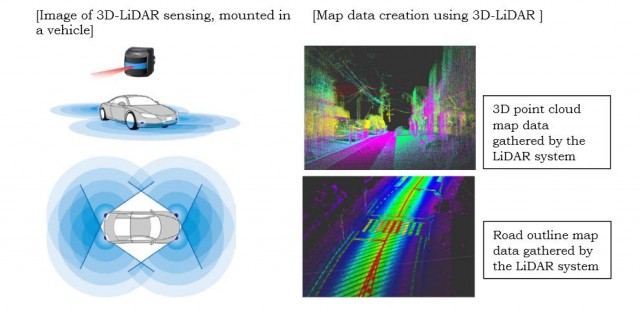Pioneer is pioneering applying techniques from LaserDiscs of the past for new 3D LIDAR (light detection and ranging) sensors that are expected to be cheaper than present laser systems used in autonomous self-driving cars.
Pionneer optical pickups formerly used in laserdisc players, which it made for 30 years until 2009, are a major component for a compact 3D-LIDAR system that could cost less than ¥10,000 (US $83) by 2025.
Pioneer is testing the 3D-LiDAR high-performance, compact, low-cost driving sensors in-car trials with planned commercialization of 3D-LiDAR for business use in 2017, and for private passenger vehicles from around 2018
Pioneer Corporation recently completed trials of its 3D-LiDAR (Light Detection and Ranging) driving space sensor. The technology is needed for automated driving and advanced driving support.
During 2016, Pioneer will launch advanced map creation using mapping vehicles fitted with 3D-LiDAR, with Increment P Corporation (hereinafter, Increment P), its map creation subsidiary.
Future developments include various fields including “advanced map” necessary for automated driving, “sensors” for real-time appraisal of own-vehicle location and the surrounding environment, and “network system” for updating and disseminating such information at any time. The sensors can finely detect the distance of objects several dozen meters ahead, as well as their width, even object identification becomes possible, based on shape detection.
The 3D-LiDAR system is equipped with a proprietary technology. In the future, Pioneer plans to create a much more compact and lower-cost version to overcome the hurdles of size and price that hinder the spread of the system.
